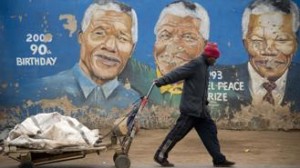 Forty years after government killings here sparked the militant anti-Apartheid movement, the ailing grandfather of modern South Africa is a reminder not to return to the past.
Forty years after government killings here sparked the militant anti-Apartheid movement, the ailing grandfather of modern South Africa is a reminder not to return to the past.Soweto – Thoko Dhlamini smiles, takes her foreign visitor by the hand and points toward the center of the aisle: “Now the kids are coming back from school to receive the benediction,” she says. “I pray for them not to go through what I went through. I pray for this country to remain united, even when Mandela is gone”. It’s Sunday morning in Holy Cross, the Anglican church of Soweto overlooking the corner where on June 16, 1976 Hector Pieterson died. The government had decided that the children should study Afrikaans as well as English. Students took to the streets, the police opened fire, and a 12-year old boy was hit with a fatal bullet. Hector became the martyr and catalyst of the anti-apartheid revolt, which was confrontational and sometimes violent until Nelson Mandela was finally freed from prison in 1990. “There’s a famous picture with a young man carrying Hector’s body in his arms,” Thoko explains. “This young man was named Mbuyisa, he was my cousin.” Her family lived 100 meters from the house of Walter Sisulu, a South African anti-apartheid militant, and the night before the bloodshed members of the African National Congress had given them placards to write anti-Afrikaans slogans. “I had no clue what they were meant for, I could not imagine that the next day our lives would change,” she said. “Fourteen years of civil war, arrests, executions in front of my house. Going to school every day was like crossing a front line. And how many comrades did I see arrested, tortured, killed… After this picture was taken, my cousin had to flee abroad.” How much longer? The children have received Rev. Khumalo’s benediction and are ready to run outside to play on the lawn near the memorial built for Hector Pieterson. “Let’s pray for Mandela’s family during this tough time when Tata is so sick and let’s pray for him as well.” Tata, as the 94-year-old “grandfather” of all South Africans is known, is in a Pretoria hospital bed, in critical condition following a lung infection. “I don’t think it will last much longer,” says a teacher from Limpopo, leading a class from the northernmost province of South Africa on a visit to the museum dedicated to the uprising. “But Mandela has already done his miracle, extending his hand to his own jailers and unifying the country. Now it’s our turn to carry it forward, avoiding any return to the past.” On this Sunday, Thoko proposes to go to the mass in Regina Mundi, the Catholic parish church where clandestine meetings of government opponents took place during Apartheid. “When they killed Hector, we all ran towards Regina Mundi, because we knew the priest would hide us. But the police came in anyway and started shooting inside the church.” Today a splendid sun shines and the faithful are praying quietly beneath a stained-glass window that depicts Mandela. Father Sebastian comes to us, the young black priest now carries on his shoulder this huge historical legacy. No civil war “We pray every day for Madiba (another term of endearment for Mandela). Every kind of rumor is going around: someone says that he’s already dead, but that the government is hiding it because of Obama’s visit. I don’t think so, but that’s how it goes here.” Don Sebastian adds that South Africa is also suffering because journalists keep warning about how South Africa might collapse after Mandela’s death. “This way you end up creating a feeling of fear that in fact does not exist,” he tells La Stampa. “No one here is getting ready for a civil war. There are only a few white extremists and they aren’t strong enough to overthrow the government. Black people are in power and don’t have any interest in provoking violence to take revenge from things that happened more than 20 years ago. Nowadays South Africa is united, white kids go to school with black kids. If there is but one problem, it is the economy and the lack of work which goes beyond racial barriers.” Father Sebastian appreciated the visit from the U.S. President, who was in Soweto on Saturday: “I hope he is being serious when he says he wants to invest in Africa. But for me, the most important message he sent was to show that the world was with us, if we behave in a responsible way. I hope everybody understands that.” Walking towards Mandela’s old house, which has become a tourist attraction, Thoko opens up: “This priest is right. My daughter graduated in economics in New York and she still can’t find a job. People do not trust the ANC anymore, they’re too corrupt. (President Jacob) Zuma might be defeated at the next elections.” Tourists are queuing in front of the house, and some will surely eat in the nearby Soweto restaurant of his ex-wife Winnie: “Here we are,” says Thoko with a smile. “Let’s hope we meet again here next year to eat Boerwors sausages”.
Ti è piaciuto l'articolo? Sostienici con un "Mi Piace" qui sotto nella nostra pagina Facebook



























